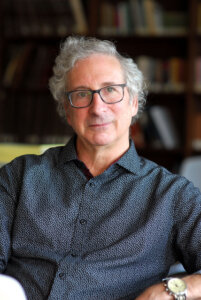Let the Boredom Begin
This week’s reading begins: “The Lord spoke to Moses, saying: Tell the Israelite people to bring Me gifts…” (Exodus 25:1-2) The rest of the book of Exodus deals with the construction of the Tabernacle, a portable temple, from these gifts, with a short reprise for the production of the golden calf, and a few pronouncements about the importance of the Sabbath. We have detail upon detail concerning the structure of the Tabernacle and its accoutrements, down to pails, scrapers, basins, flesh hooks and fire pans. And in case that isn’t enough, most information is narrated at least twice: once as God commands Moses, and again as the command is executed. These 16 chapters try the patience of even the most ardent student of the Bible.
Why all this detail? The key, I believe, is in Exodus 25:8, toward the beginning of this week’s portion: “And let them make Me a sanctuary that I may dwell among them.” The Tabernacle is God’s custom-built home. This may be unsettling for us, with our abstract notions of God, but not for our ancient Near Eastern ancestors, who viewed the Tabernacle as a real home for God. The innermost section of the building, the holy of holies, contains the ark, which served as God’s throne. This explains why the high priest entered it only once a year, on Yom Kippur, and then only while carrying incense, which functioned as a smokescreen preventing him from seeing the divine presence, and dying. (Leviticus 16:13)
The bottom line, according to Exodus, is that God wanted a custom-built house and could dictate his terms to the Israelite “contractors.” The consequences of deviating from this plan are serious: God will not dwell in an improperly constructed house, and thus the divine presence will not protect Israel. But the directions were, according to the text, followed precisely, and as a result (Exodus 40:33-34): “When Moses had finished the work, the cloud covered the Tent of Meeting, and the Presence of the Lord filled the Tabernacle.”
Of course, we cannot forget the effect that magnificent structures can have on the worshipper, as well. Thus, the clothes of Aaron, the high priest, were “for dignity and adornment” (Exodus 28:2, 40), and certainly the Tabernacle as a whole was built as a grand structure with symbolic and aesthetic value. Anyone who has visited the great cathedrals and churches of Europe, or the Dohány Synagogue in Budapest, cannot avoid being awed by the way that remarkable architecture and precious materials can enhance the religious experience. Thus, although the detailed repetitions in Exodus are meant to stress that God’s plan is to be followed exactly to ensure the divine presence among Israel, they also narrate how to create a structure that can enhance the worshipper’s experience, as well.
But what are we to do now? Do we need to make God comfortable in our synagogues? We are not the first to grapple with this problem. The prophet Ezekiel lived among the exile community in Babylon, around the destruction of the First Temple in 586 BCE. He quotes God saying (11:16): “Though I have removed them far among the nations and have scattered them among the countries, I have become to them a diminished sanctuary in the countries whither they have gone.” This verse is often misunderstood to mean that the synagogue as an institution developed during the Babylonian exile, in the sixth pre-Christian century, but there is no evidence for that. It suggests that no building is needed, since God will function as “a diminished sanctuary” with Israel in exile — not as strong as the divine presence localized at the Temple, but a presence nevertheless.
We are the heirs of Ezekiel rather than of the last section of Exodus — we do not believe in a deity localized in our synagogues, which are called houses of meeting and prayer, unlike the biblical “house of God.” These architectural spaces thus do not need to follow the plan of the Tabernacle to make God “at home,” but still must be spiritual and beautiful structures that help foster continuing encounters with the divine, places that are “for dignity and adornment.”
Marc Zvi Brettler, currently in Jerusalem as a visiting scholar at the Mandel Leadership Institute in Jerusalem, is on sabbatical from Brandeis University, where he is the Dora Golding professor of biblical studies in the department of Near Eastern and Judaic studies.
















